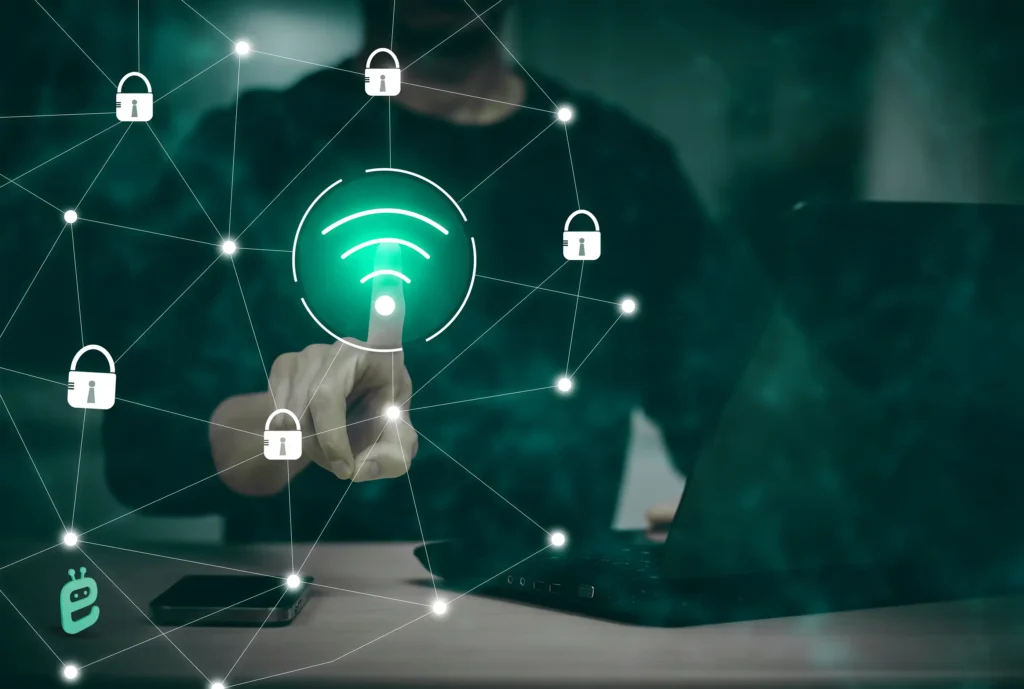A network security key is basically a password or passphrase that presents a right of entry to a wi-fi network. It serves as a shielding degree by encrypting the facts transmitted among devices related to the community, making it hard for hackers or unauthorized individuals to intercept or control touchy information.
Introduction
Ensuring the safety of our wireless networks is of paramount significance in this digital era. One crucial element of maintaining community protection is the use of a network security key. Also called a Wi-Fi password or network security key, this vital issue plays a crucial role in safeguarding our wireless connections from unauthorized access and cyber threats.

The importance of getting a strong and network security key can’t be overstated. It acts as the first line of defence in opposition to potential intruders attempting to gain unauthorized access to your wi-fi network. By utilizing complex and hard-to-waive passwords, you significantly reduce the hazard of unauthorized people infiltrating your network and probably compromising your non-public or business statistics.
Having an encrypted wi-fi network ensures that any data transmitted over it stays secure and private. This is specifically critical when coping with sensitive statistics, financial transactions, personal information, or personal business communications.
A network security key plays a critical role in maintaining the integrity and privacy of our wireless networks. By enforcing sturdy passwords and encryption measures, we will enhance our universal network security and defend ourselves from cyber threats.
Various Network Security Keys and Their Functions
When it comes to community security, the use of the proper type of key is crucial to shielding your statistics and stopping unauthorized access. We will discover the specific kind of network security key and its function.
One generally used secret is the WEP (Wired Equivalent Privacy) key. It became one of the earliest encryption standards used for securing wireless networks. Yet it has been deemed insecure because of susceptible factors in its encryption algorithm.
The WPA (Wi-Fi Protected Access) key replaced WEP as a more secure option. It introduced TKIP (Temporal Key Integrity Protocol) encryption, which provided more potent safety against attacks. As generation advanced, WPA became insecure against assaults as properly to deal with those susceptible points, WPA2 (Wi-Fi Protected Access 2) was introduced.
It carried out the more potent AES (Advanced Encryption Standard) encryption set of rules and CCMP (Counter Mode with Cipher Block Chaining Message Authentication Code Protocol). This made it drastically more stable than its predecessors.
WPA3 has been delivered as the modern, popular solution for community protection. It offers stronger protection through individualized facts encryption and advanced authentication strategies. It provides protection against offline dictionary attacks with the aid of simultaneous authentication of equals (SAE).
These extraordinary kinds of keys are used at the end of network security protocols to ensure a stable connection between devices and networks. Some commonplace protocols include WEP, WPA-PSK (Pre-Shared Key), and WPA-Enterprise.
Understanding the distinctive sorts of network security key and their functions is critical for maintaining secure wireless community surroundings. Choosing the correct key and protocol can help safeguard your statistics from unauthorized access and potential threats.
Tips for Creating Strong and Secure a Network Security Key
Creating a sturdy and stable community protection secret is essential for shielding your community from unauthorized get-right-of entry to. A vulnerable or effortlessly guessable password places your network susceptible to being compromised. We will offer you a few useful recommendations to ensure that your network security key is powerful and secure.
1. Use an aggregate of uppercase and lowercase letters: Including each uppercase and lowercase letter in your network security key increases its complexity, making it harder to crack. Stay clear of using well-known words or terms since they may be effortlessly guessed.
2. Include numbers and unique characters: Adding numbers and unique characters such as @#$%^&* to your network security key provides an extra layer of complexity. This makes it extra hard for capacity attackers to guess the password.
3. Make it long: The longer the password, the more secure it’s miles. Aim for at least 12 characters on your network security key; however, ideally, cross for even longer if feasible.
4. Avoid non-public records: Do not use any personal records such as names, birthdates, or addresses to access your network security key. This fact can be acquired without problems with the aid of attackers through social engineering techniques.
5. Change it regularly: It’s crucial to trade your network security key periodically to keep its energy and prevent unauthorized entry over time. Consider converting it every few months or on every occasion there are huge adjustments within your community environment.
6. Don’t reuse passwords: Avoid using the same password for more than one device or for money owed inside your community infrastructure. If one tool gets compromised, having precise passwords will prevent unauthorized access.
By following these pointers, you can create a sturdy and secure network security key that helps protect your precious records from capacity threats and intrusions into your wireless networks.
Best Practices for Safeguarding Your Network Security Key
For both people and establishments, community protection has emerged as a crucial difficulty. With the growing chance of hackers and cyberattacks, it is vital to implement great practices to shield your network security key.
One of the first steps in securing your network is to ensure that your Wi-Fi community is properly protected. This can be achieved by allowing encryption, including WPA2 or WPA3, which encrypts the facts transmitted among devices for your network. You need to alternate the default username and password on your Wi-Fi router to prevent unauthorized access.
Another critical exercise is to regularly update the firmware of your router.
Manufacturers often release updates that address vulnerable factors and boost the safety of their devices. By keeping your router updated, you may be one step ahead of hackers, who may also make the most outdated firmware.
It is also crucial to apply sturdy passwords for both your Wi-Fi community and any administrative accounts related to it. A strong password ought to be wonderful and complicated and incorporate a combination of special characters, numbers, and capital and lowercase letters. Avoid the use of commonplace words or easily guessable records like birthdates or addresses.
Implementing a firewall can provide an extra layer of protection in your community by tracking incoming and outgoing visitors and blocking any suspicious activity. Many routers have built-in firewalls that can be enabled through their settings.
Regularly tracking your network for any uncommon pastimes or unauthorized devices is another great practice for protecting your network security key. This may be completed by reviewing logs supplied through your router or using a specialized software program that detects capacity threats.
Educating yourself and others about approximately common hacking techniques, which include phishing scams or social engineering assaults, can help prevent unauthorized access to your network. Stay updated on cutting-edge security trends and encourage others in your organization or family to do the same.
By following these satisfactory practices for safeguarding your network security key, you could extensively reduce the hazard of falling victim to hackers and guard your sensitive information from unauthorized access.
The Consequences of Inadequate Network Security and the Importance of Regularly Updating Your Network Key
Network safety risks are a prime challenge for people and organizations alike in modern-day interconnected global. The outcomes of insufficient network security may be severe, ranging from record breaches to financial loss and reputational damage. It is vital to prioritize the security of your network and take proactive measures to shield sensitive statistics.
One critical step in maintaining community security is regularly updating your network key, especially your Wi-Fi password. Your network security key acts as a barrier between your gadgets and capability intruders, preventing unauthorized access to your community. By regularly converting this key, you may substantially reduce the risk of unauthorized people having access to your network.
Data breaches have turned out to be more and more common in recent years, with cybercriminals constantly evolving their strategies to exploit susceptible factors in networks. Inadequate network safety features make it simpler for those criminals to break down structures and gain access to exclusive records, which include private information or alternate secrets and techniques.
Regularly updating your Wi-Fi password adds an extra layer of protection against capacity threats. It guarantees that even if a person manages to reap an old password, they will now not be able to gain an advantage in gaining access to your network.
Regularly updating your network security key demonstrates a proactive approach to safeguarding touchy statistics. It suggests that you are actively tracking and addressing any shortcomings within your system.
Inadequate network security can have severe and long-lasting consequences. By recognizing the importance of often updating your network security key, specifically your Wi-Fi password, you may notably lessen the threat of data breaches and unauthorized access. Prioritizing strong safety features will now not only shield treasured records but additionally protect the reputation and consideration of both individuals and businesses in an increasingly virtual world.
FAQS
A network security key is a string of characters used to secure a wi-fi network. It is likewise, on occasion, called a Wi-Fi password or passphrase. It serves as a barrier to prevent unauthorized entry into the community.
You can locate your network security key at the router or get entry to the factor’s label, inside the tool’s network settings if you’ve formerly connected to the community, or via the router’s administration interface accessed via an internet browser.
Yes, you can and have to exchange your network security key periodically for better protection. You can try this via your router’s settings by having access to its web interface and enhancing the wireless security settings.
WEP (Wired Equivalent Privacy) is an old and less secure encryption technique, even as WPA (Wi-Fi Protected Access) and its next variations (WPA2 and WPA3) provide stronger safety. It’s advocated to apply WPA/WPA2/WPA3 keys for better safety of your wi-fi network.
Conclusion: Strengthen your community’s defenses with a robust and steady network security key.
It is important to prioritize community protection and toughen your community’s defenses by enforcing a robust and steady network security key. By doing so, you can defend sensitive data, prevent unauthorized access to it, and mitigate capability-based cybersecurity threats. A network security key serves as a barrier against risky attacks and ensures that only authorized customers have access to your community.
It acts as the first line of defense in safeguarding your treasured facts from hackers and cybercriminals. Investing in a robust community protection secret is an investment in the universal safety of your commercial enterprise or employer. It gives you peace of mind knowing that your network is fortified with advanced encryption algorithms and authentication protocols.
READ MORE!!!!!
